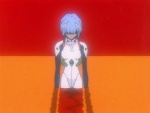Theory and Analysis:Rei and the Moon: Difference between revisions
(→Appearances: Testing float/align behaviour) |
m (→Asuka and the Sun: Oh, if you want to be possessive, it's just I-T-S, but if you want to make a contraction, it's I-T-'-S!) |
||
| Line 106: | Line 106: | ||
*In Eva-02's dying moments in ''The End of Evangelion'', Asuka reaches upwards towards the Sun. | *In Eva-02's dying moments in ''The End of Evangelion'', Asuka reaches upwards towards the Sun. | ||
Beyond representing Asuka's solar and dominant nature, and being a further illustration of the contrast between Asuka and Rei, | Beyond representing Asuka's solar and dominant nature, and being a further illustration of the contrast between Asuka and Rei, its significance to the actual story is less clear. | ||
==References== | ==References== | ||
Revision as of 01:22, 17 May 2008
Throughout the entire series Rei Ayanami is associated with the recurring visual motif of the Moon. In fact, the Moon is rarely shown in Neon Genesis Evangelion without Rei in the foreground. Exceptions would be the shots of the Spear of Longinus heading towards the Moon, and the "Moon's eye view" of Second Impact as seen during Episode 12.
Appearances
- During the opening credits there is a shot of Rei standing before the Moon.
- During episode 6 Rei stands silhouetted against the Moon before the battle with Ramiel.
- During episode 10 there is a shot of Rei swimming seen from below as she passes in front of a light, visually similar to the Moon.
- The closing animation features Rei and the Moon together.
- During episode 25 Rei sits inside a Moon-like spotlight, while Asuka sits in a Sun-like spotlight, see Asuka and the Sun below for more information.
- The white giant in Terminal Dogma, who we later learn is, in fact, Lilith, wears a mask with crater-like markings. This serves to associate her with the Moon, and thus with Rei.
| Rei and the Moon | ||
 |
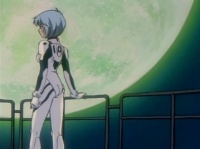 |

|
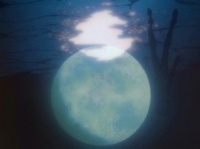 |
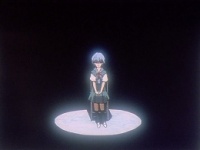 |
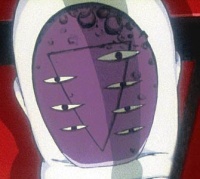
|
|
From left to right, starting at the top left:
| ||
- Rei awakens in the moonlight and gazes up to the Moon before breaking Gendo's glasses and leaving her apartment for the Dummy Plug Plant.
| Rei awakens in the moonlight | ||
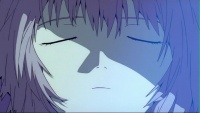 |
 |

|
 |
 |
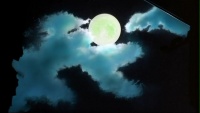
|
| ||
- During First Impact 4 billion years ago the Black Moon transporting Lilith collided with Earth, and the Earth's Moon formed from the resulting debris. Thus Lilith's arrival created the Moon to begin with.
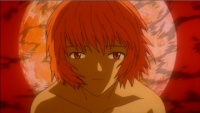 |
Rei as Lilith appears before the Moon throughout End of Evangelion. |
In astrology the Moon rules over the sign of Cancer (breasts), is dignified in the sign of Taurus (throat) and is debilitated in the opposing sign of Scorpio (sexual organs).[1] The terms Black Moon and White Moon are again from astrology. White Moon describes the lunar perigee while Black Moon describes the lunar apogee, when the Moon is closest or furthest from the Earth respectively. Furthermore the Moon has two nodes: Caput Draconis and Cauda Draconis, the dragon's head and tail, these are the two points along the ecliptic that the Moon intersects as it moves north or south of it.
In many systems of planetary attribution to the human body the Moon is associated with one of the eyes (see the myths surrounding Odin, Horus, Tsukuyomi, etc) and the Sun with the other. The Sun and the Moon are seen as counterparts to each other. Usually, the left eye is associated with the Moon. In Rei's Monologue during episode 14 this relation between the eye and Moon is reinforced by a cut of Rei's left eye, followed immediately by a cut to the moon. The same shot of Rei's left eye is used during the opening credits.
In the Jewish Qabala the Shechina (that aspect of God that dwells with the people and appeared to Moses in the burning bush) is said to have 28 camps that relate directly to the 28 days of the lunar month[2][3][4] which also parallel the 28 periods of time spoken of in Ecclesiastes, these are further given 14 positive qualities and 14 negative qualities from the 7 transpositions of Wisdom, Wealth, etc.[5]
The words "lunatic" and "loony" stem from the Latin word Luna, meaning Moon. These words developed because the Moon was thought to cause periods of mental instability. Further, the words month (moonth) and Monday (Moon day) come from the word Moon, this is also reflected in other languages, e.g. French: Luna (Moon), Lundi (Monday).
Asuka and the Sun
The visual motif pairing Rei and the Moon is strong and frequently occurs throughout the series, and due to Rei's connection to Lilith it is thematically important. To a lesser extent there is a visual motif pairing Asuka with the Sun.
- The first shot introducing Asuka has her silhouetted against the Sun.
- In episode 25 Asuka is sitting in a Sun-like spotlight, contrasting with the Moon-like spotlight that Rei is sitting in.
| Asuka and the Sun | ||
 |
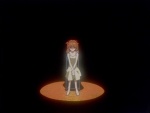 | |
| ||
- In Episode 09, Asuka harasses Rei by standing in front of the sun, blocking her light while she reads her book.
- In Eva-02's dying moments in The End of Evangelion, Asuka reaches upwards towards the Sun.
Beyond representing Asuka's solar and dominant nature, and being a further illustration of the contrast between Asuka and Rei, its significance to the actual story is less clear.
